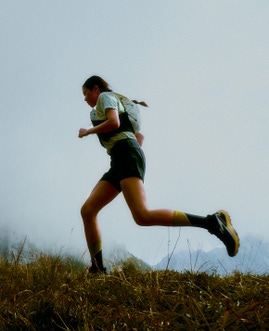Salomon athlete Marc Lauenstein has a dental practice and is married with two kids, ages three and one. Somehow, the Swiss trail runner finds a way to train effectively enough to compete and win some of the biggest trail races in the world. In 2016, he won the challenging Three Peaks Race in the UK, as well as the Matterhorn Ultraks Trail in Zermatt. He also finished 2nd to Kilian Jornet at the famed Zegama Aizkorri mountain marathon last season. Knowing that many of you have full-time jobs like Marc, we asked him to share how he trains effectively with a busy life schedule. “It’s not as if patients have to wait if I go running. That’s not an option,” says the 36-year-old former professional orienteer.
SET A GOAL - This is not new, but if I’m being honest, if I don’t have any goals, I stop training. There are several times each year when I stop training completely and I know then that it’s important for me to set a goal. Otherwise, it’s difficult to come back to a level where I can compete well.
HARD BLOCKS – It’s very important to vary your training. Have three or four days where you have very hard blocks. It’s not fun, but if you want to make progress in your fitness, you need to do those
KEEP MOVING - If you lose days where you can’t do your training, don’t worry about missing a day that you have too much going on. It’s just important to get some kind of movement on those days. Some nights I go out at 10 or 11pm for a 15-minute jog just to get some movement and some meditation time.
INTERVAL TRAINING - It’s important to do some training where you push your limits. Vary them in volume, but also in intensity. If you can do twice a week intensity training, that’s great. Or if it’s once, do it. But twice is great.
EMBRACE THE MORNING – I can’t believe I’m telling people this because I’m REALLY not a morning person. Still, I’m always surprised that if I go training in the morning, it gives me energy for the whole day, even if I don’t get as much sleep that night. When I wake up, it feels horrible. The trick for me is preparing everything I need for my run the night before—my breakfast, my shoes and my clothing. So when I get out of bed, I hit the road and I’m still almost sleeping for the first five minutes of my run. I don’t even feel like I’m running. It takes time until you feel comfortable with that. You need to do it regularly for a week or two. Not every day, but after maybe the fifth time doing, it feels great.
CORE STRENGTH - I have to be careful to do my homework with core strength. I plan to do it in the evening but I get tired and things come up in life. But if you don’t do it, you pay the bill for it later in trail running. Though I’ve never had the feeling that I was lacking the strength to hold my running position, the core needs to be strong enough to run with the proper form.












